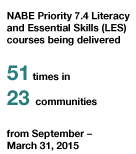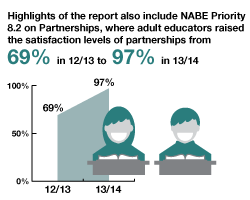NORTHWEST TERRITORIES
Northern Adult Basic Education Program
PURPOSE: To address the unique challenges faced by Northerners and to ensure that they have improved access to training and are better positioned to participate in the labour market.
PROGRAM PARTNERS
Aurora College and Government Canada Canadian Northern Economic Development Agency (CanNor)
DESCRIPTION
The Northern Adult Basic Education program was created as part of Budget 2011, the Next Phase of Canada’s Economic Action Plan – A Low-Tax Plan for Jobs and Growth.
This program will prepare working age adults to either enter the workforce directly, or to take vocational training before entering the workforce.
Northerners, including Aboriginal people, want to enjoy the same educational opportunities and ability to participate in the labour market as other Canadians. This initiative supports northern economic development by raising the basic skill levels of working age local residents. The program helps to ensure that more Northerners can apply for local jobs or take further vocational training. The Northern Adult Basic Education Program also builds capacity in the territories to offer increased adult basic education, which will help public and private employers hire locally.
From April 2011 to March 2016, the Government of Canada will invest $27 million to expand adult basic education in the three northern territories. Funding was provided to tri-territorial colleges to improve adult basic education services. The funding was distributed based on each territory’s adult basic education needs, and calculated according to each territory’s share of working age Northerners lacking a grade 12 education, as follows:
• Aurora College – 37.1 percent
• Nunavut Arctic College – 44.5 percent
• Yukon College – 18.4 percent.
Programming is being delivered through the Colleges to build capacity by increasing the number of instructors, improving educational materials, increasing capacity to assess student needs, and increasing the number, frequency and locations of course offerings.
RESULTS
The Northern Adult Basic Education Strategy and Work Plan 2012–2016 identifies ten priorities to inform where Northern Adult Basic Education Program funding is allocated, and which are reported on to CanNor on a quarterly and annual basis.
The cumulative results for the Northern Adult Basic Education Program, including CanNor’s quantitative indicator results, can be found in the 2013-14 Northern Adult Basic Education Annual Report. Highlights of the report also include Northern Adult Basic Education Priority 8.2 on Partnerships, where adult educators raised the satisfaction levels of partnerships from 69 percent in 12–13 to 97 percent in 13–14.
This partnership between Aurora College and Northwest Territories Aboriginal Skills and Employment Training Strategy holders has shown innovation and creativity by exploring and identifying funding options for adult learners, increasing awareness of services offered by the various partner agencies and offering new and additional courses in more communities, including Literacy and Embedded Essential Skills courses. The Partnership has since been nominated for the 2015 Premier’s Collaboration Award.
In addition, the 2013–14 Northern Adult Basic Education Priority 10 Analysis of the Adult Literacy and Basic Education and Access SRS Data (Technical Report), provides a longitudinal context (pre and post Northern Adult Basic Education) to track student success within Aurora College and those who have progressed from the Adult Literacy and Basic Education and Access programs to other college programs.
Noteworthy is the Northern Adult Basic Education Priority 7.4 Literacy and Essential Skills courses being delivered 51 times in 23 communities from September – March 2015. This activity has also garnered media attention, through three videos and information has also been presented at various public forums.
FURTHER INFORMATION
Northern Adult Basic Education (NABE) Program










